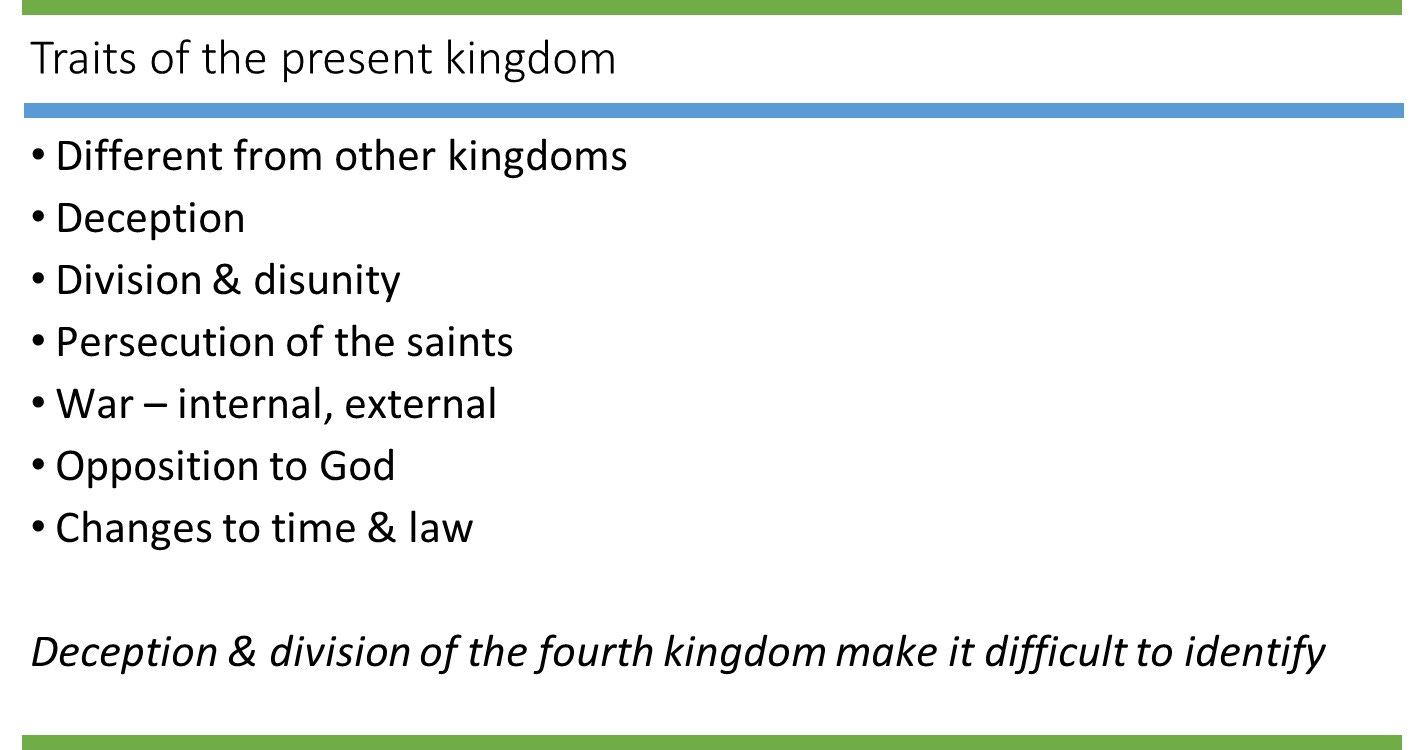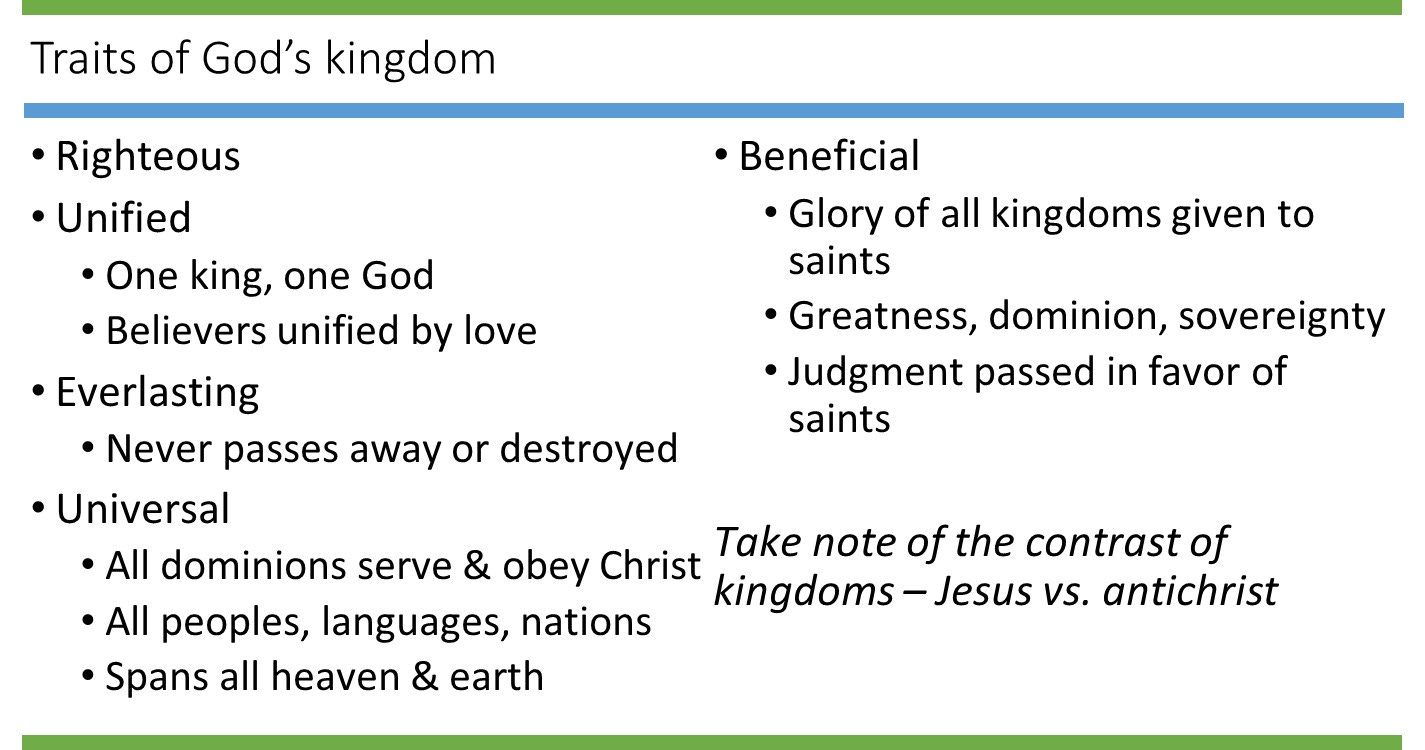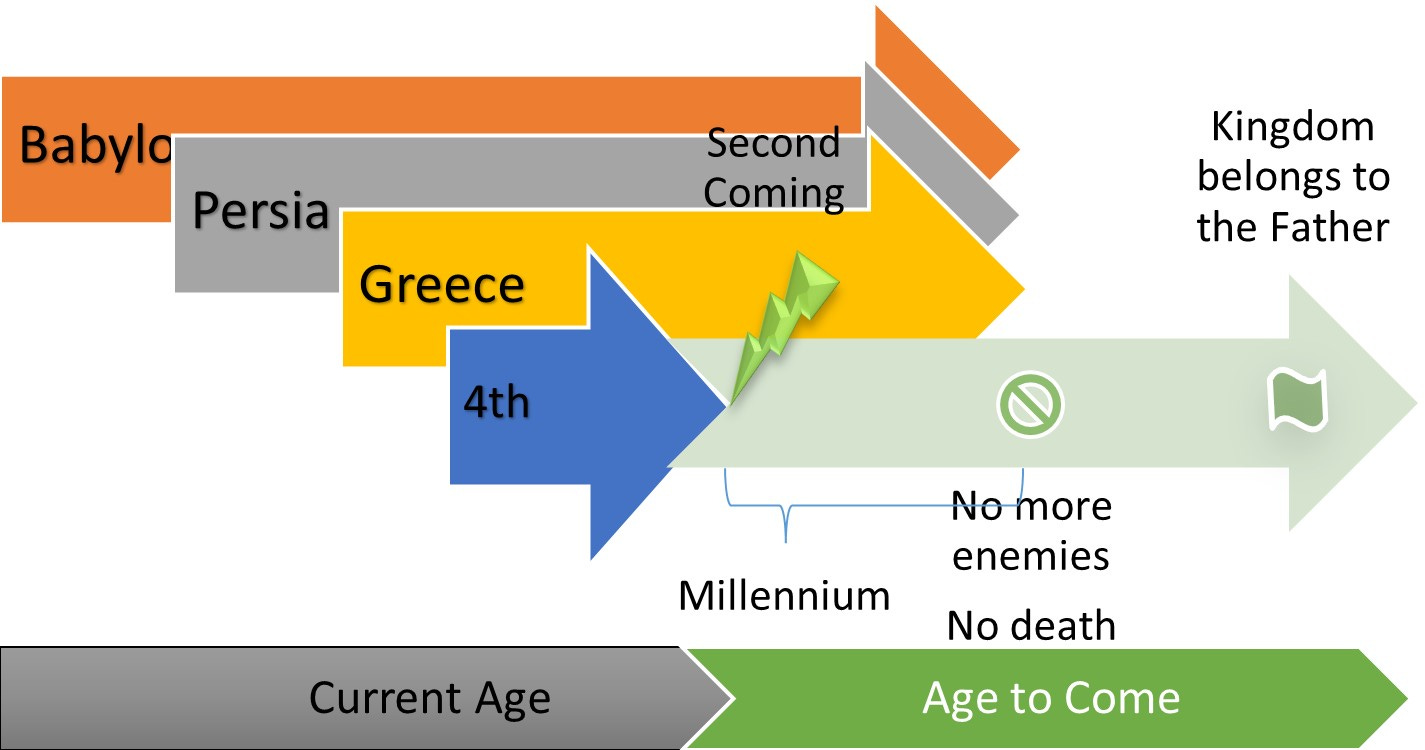[Another excerpt from The Fourth Kingdom. We can learn the identity of the fourth kingdom from contrasting it to the other kingdoms. This helps us realize that we cannot simply call it the Roman Empire and assume that we have exhausted the depth of Biblical prophecy. The fourth kingdom is substantially different from its predecessors that we must look beyond the simple answer. Don’t forget to check out my new book First Sign at Amazon.com]
I’d like to spend some time discussing what it means to live in the era of the fourth kingdom. First, I need to quickly summarize ancient history.
Reconciling identity
Most Christians identify the fourth kingdom as the ancient Roman Empire. This makes sense given the undisputed historical record of this era. Rome conquered Greece. Here ends the lesson. I used to teach this link (Rome equals fourth kingdom) to my students as an undisputed fact. As I continue to research the Bible, I often find my original assumptions die from lack of biblical sustenance. Hence, my reliance on the clear text (along with confirmation) of the Scriptures now relentlessly guides my writing and teaching.
Only recently have I realized that the Bible never specifically identifies the fourth kingdom as Rome. While researching this book, I could find no scriptural evidence for any name. Nor could I discover any verse which pinpoints anyone like Julius Caesar or Octavian as its prominent king. This has made me rethink how we view this kingdom. Calling it “Rome” only partially answers its identification. Allow me to explain.
Overnight success
The first three kingdoms rose from prominence to dominance in a noticeably brief period. Babylon didn’t start with Nebuchadnezzar. King Hezekiah received emissaries from Babylon long before Nebuchadnezzar’s birth (2 Kings 20:12-19, 2 Chronicles 32:31, Isaiah 38:1-8). Nebuchadnezzar’s father expanded Babylon by conquering rival powers. Nebuchadnezzar commanded some of these victories before he ascended to the throne. Overall, he conquered much of the Middle East in a series of campaigns which spanned about twenty years.
Similarly, the Persian Empire grew slowly for decades. Eventually, they challenged the heart of the Babylonian Empire following a few military successes around its edges. Within the span of a few days, the Persians defeated the Babylonian army and conquered the capital city of Babylon itself. Literally overnight, the Persian Empire exploded in size, population, wealth, prominence and power.
We assign the title “the great” to Greece’s Alexander due to his military successes. He conquered the known world by the age of thirty. Like the kingdoms of Babylon and Persia, Greece expanded suddenly under the leadership of a single king (or pair of leaders in the case of Persia).
Relentless success
Ancient Rome followed a much different pattern of success. Once Rome established control over the western Mediterranean Sea in the 2nd century B.C. they tolerated Greek domination over the east for decades. With increasing frequency, the declining patchwork of Greek kingdoms requested Roman intervention to settle their internal disputes. Even the newly independent Jews of Judah requested Rome’s help to stave off a renewed wave of Greek domination. Through a protracted series of wars, advances and withdrawals, the Romans won all lands adjoining the Mediterranean.
Rome expands for centuries until reaching its zenith in the 2nd century A.D.
So which Roman leader deserves the biblical honor as the king of the fourth kingdom? Pompey occupied Jerusalem and desecrated the temple in 63 B.C. Julius Caesar expanded Roman power northward into Western Europe. Augustus consolidated control as its first emperor. Titus destroyed Jerusalem and the temple in 70 A.D. While each of these men (and possibly others) may have some claim to the title, the Bible identifies none of them.
We can’t blame this silence on lack of opportunity since the New Testament writers lived at the same time as many of these men. Isaiah identified Cyrus by name hundreds of years before his birth (Isaiah 44:28). If we can’t pick our favorite emperor and the Bible doesn’t name one, what can we do?
Let’s follow the revelation which God has given to us. Observe the focus of Daniel 7 on the little horn (vs 8, 11, 20, 24-26). Could this leader represent the fourth kingdom? Yes! Daniel’s description of each beast includes some reference to its representative king. Notice that the description of Greece includes references to the four kings who follow Alexander, but we consider Alexander its prominent king. So the fourth kingdom references ten kings but focuses on the little horn. This king, like his kingdom, remains unnamed.
We find another difference between the fourth kingdom and the others in Daniel 7. Rather than coming at the start of his empire, the little horn rises to power at its very end. The ten kings don’t appear until the end, too.
This indicates to me that the kingdom never finds total fulfillment until the antichrist and the ten kings come to power. Remain skeptical of the claims made by some Christians. Many exaggerate his accomplishments while ignoring his scriptural actions and limitations. Stick to the Bible.
The antichrist rules at both start and end
Beyond Daniel, we find this same leader under different names in the New Testament. For example, this passage connects antichrist with other kings:
[They] are seven kings; five have fallen, one is, the other has not yet come; and when he comes, he must remain a little while. The beast which was and is not, is himself also an eighth and is one of the seven, and he goes to destruction. (Revelation 17:10-11)
Rather than provide a full explanation of this passage, I will only note that the antichrist existed as one of the five fallen kings and serves as an eighth (i.e. final) king. He reigns at both the start and end in some mysterious way. For now, we have a biblical identification for the kingdom and its most prominent king.
His kingdom resembles ancient Rome and other tyrannical powers11F[1] which have reigned over the earth for the past two millennia. I won’t attempt to make direct associations now, but we might base our choices on its seven unique attributes (see Slide 32 Unique attributes of 4th kingdom). I warn against blindly lumping nations, peoples and politicians into vague classes. We need wise men – not wise guys – to utilize the truth with humility.
Reconciling behavior
Does the Bible contain any proof that we live in the time of the fourth kingdom? Or should we resort to conspiracy theories? Maybe, we live outside of its sphere of influence. Or perhaps its impact has waned or slept for a while. Yes, the Bible has evidence of our position on God’s timeline.
The Apostle John recognizes the appearance of antichrists:
Children, it is the last hour; and just as you heard that antichrist is coming, even now many antichrists have appeared; from this we know that it is the last hour.
(1 John 2:18)
As I stated before, John’s “last hour” must have a figurative meaning since he could not have transmitted this message in less than one literal hour. We don’t have to worry that the antichrist could arrive in the future. We need to worry because we already live in his time. How do we know that we live in the kingdom of the antichrist? We can see a steady parade of his ilk.
John clearly teaches that the coming spirit of the antichrist already exists:
[And] every spirit that does not confess Jesus is not from God; this is the spirit of the antichrist, of which you have heard that it is coming, and now it is already in the world.
(1 John 4:3)
We should expect this influence because the antichrist has already ruled his kingdom once and will return to lead it again. I want to make two points: 1) Yes, Virginia, there is an antichrist. We live in his kingdom. We know this from the writings of the Apostle John. 2) We live with the effects of his spirit in the world today (Ephesians 2:2), although he hasn’t returned yet. The fourth kingdom operates on planet Earth now. We live under its leadership, authority and protection. We also live under its threat!
Slide 34 Traits of the present kingdom
Given that we live in the kingdom of the antichrist today, what can we expect from these days? Daniel both described the fourth beast differently and declared it different. Thus, we should expect things under its dominion to behave differently. Tales of graft, greed, corruption, betrayal, etc. won’t even get past the qualifying rounds. These things have always existed – read the Bible for examples in every generation. Instead of the normal, let’s use what we know about the antichrist so far[2] to learn about his influence on his kingdom.
Modus operandi
The fourth beast wages war on the other kingdoms, so we should expect to see a lot of wars during the fourth kingdom. These wars come from the inside out and from the “outside in” as the other kingdoms struggle to assert their lost dominion. More wars will come from within and remain internal to the fourth kingdom due to its divided leadership and people.
The overlapping layers of disunity within the fourth kingdom stands in contrast to the challenge of Jesus to Christians. We demonstrate our authenticity as His disciples by our love for one another (John 13:35). We gain a distinction from the kingdom of the antichrist by living outside of its power (Colossians 1:13).
The difference between the citizens of the fourth empire and God’s kingdom plays out in another way. The antichrist “wages war on the saints,” so we should expect to experience or witness persecution of believers as his spirit waxes and wanes.
We should expect spiritual deception and opposition to God prominently on display in the fourth kingdom since we see these traits in the antichrist. The existence of deception makes identification of the fourth kingdom more difficult (if not impossible). Overall, we should see these things occurring so often that they become status quo of the 4th kingdom.
Slide 35 Traits of God's kingdom
Although we live under the auspices of the fourth kingdom, we look forward to the coming kingdom of God. This kingdom, too, has unique characteristics. It exists for the benefit of its people, under the leadership of Jesus Christ and will reign forever. He establishes His kingdom on righteousness. Jesus will protect His people from the wrath of the previous kingdoms. We will live together with God for all eternity.
Reconciling timelines
In the previous chapter, I developed timelines based on the teachings of Jesus and the Apostle Paul. I added information from what we found throughout the New Testament. Our result contained two ages which pivot on the resurrection of the dead.
In this chapter we started from scratch to build two new timelines based on two visions from Daniel. We built one from Daniel 2 (see Figure 4 Daniel 2 timeline) and another one independently from Daniel 7 (see Figure 5 Daniel 7 timeline). These two timelines matched each other exactly.
Figure 7 Age and kingdom timelines
Now I present another timeline (see Figure 7 Age and kingdom timelines) which combines all the previous ones. As you can see, the timelines fit together perfectly. I built four timelines independently and arrived at the same structure. The Bible tells a consistent story from Daniel and the New Testament.
[1] like homeowner associations
[2] When we come back to study the antichrist in more detail, we should find ourselves in a better position to expand on this brief list.






